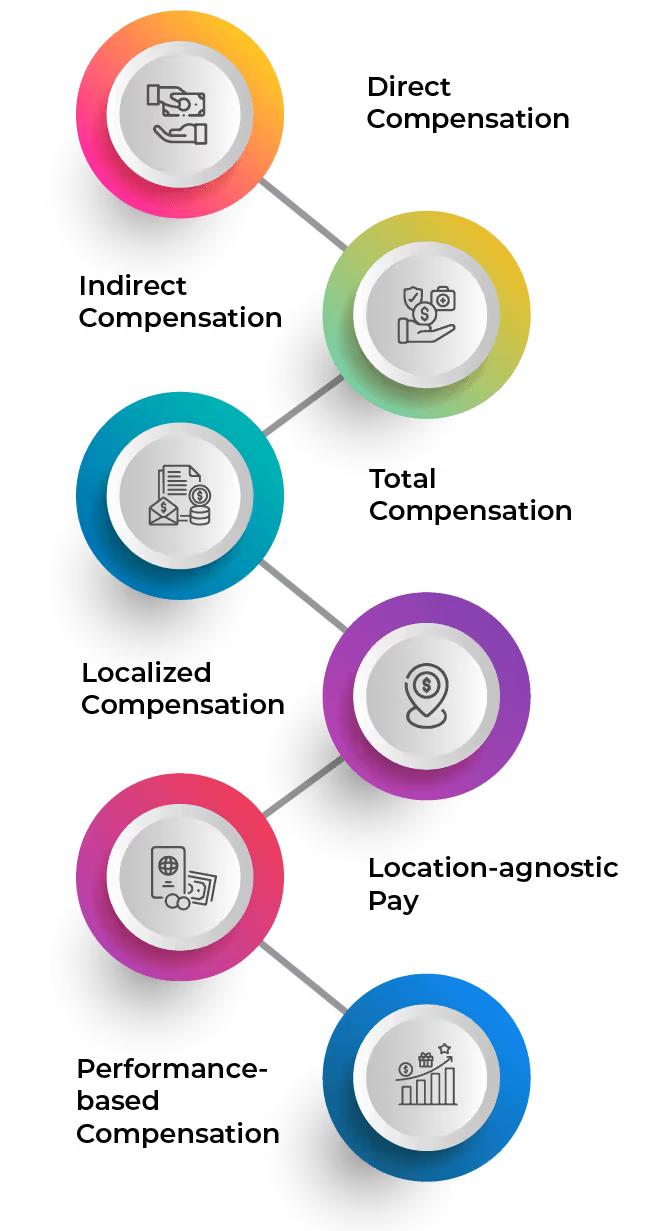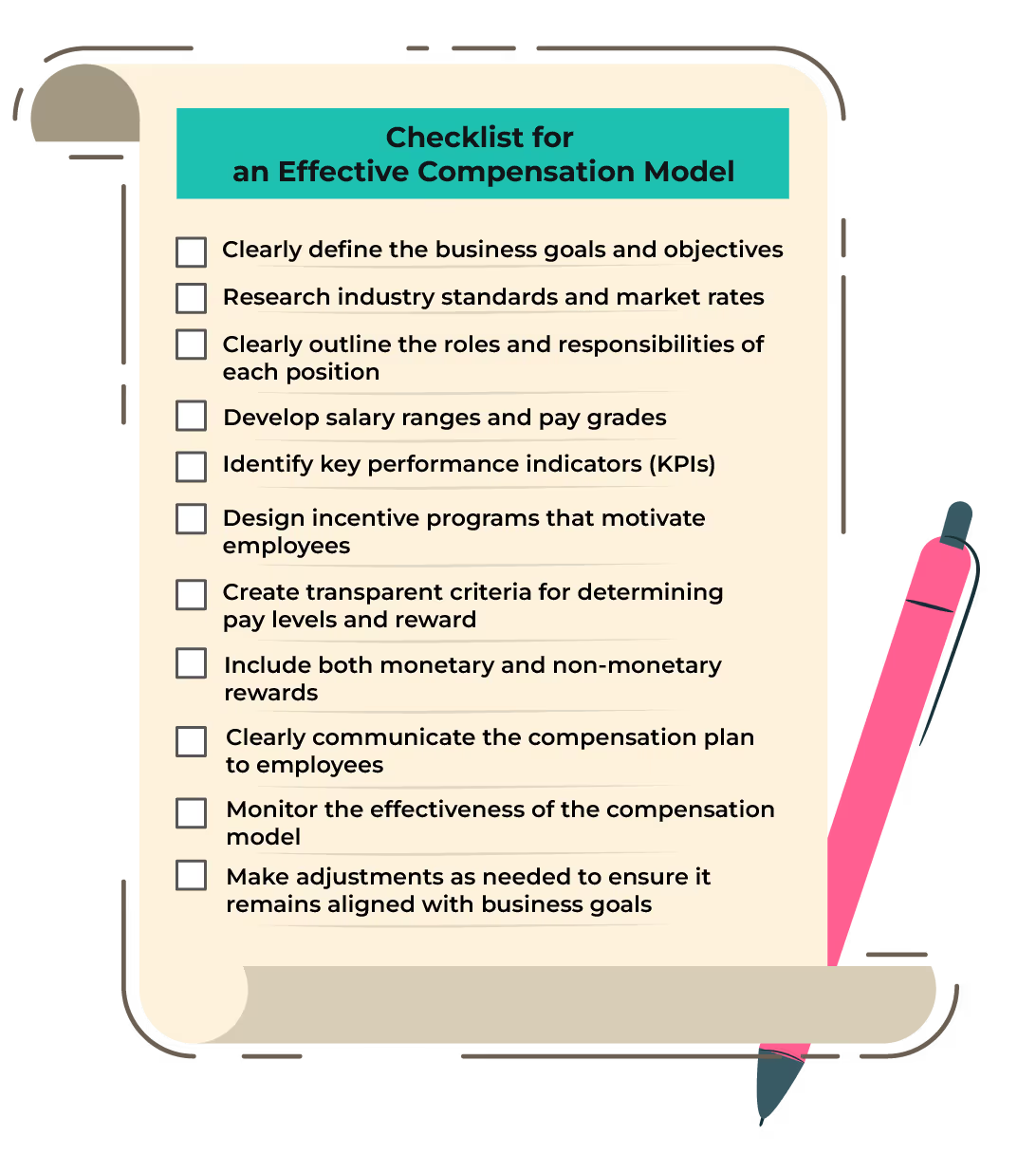
Blog
Understanding Compensation Models: Your Complete Guide
June 13, 2024


Key Insights
We all know paying your team the right way is a BIG DEAL.
It can make them fall in love with what they do. But if you get it wrong, things get ugly – demotivation, poor performance, and employee turnover. Nobody wants that headache, right? That's why a solid compensation model is non-negotiable.
Now, think about building a skyscraper. If the foundation is shaky, the whole thing is doomed to collapse. The same goes for your employee compensation model! Your compensation strategy won't stand a chance if your base isn't solid.
Get the foundation right, and everything else will follow!
Ask yourself:
👉🏼How can we snag the top talent?
👉🏼How can we grow our business smoothly?
👉🏼What kind of skills are we looking for?
Once you have answers to these questions, your strong, well-thought base is ready.
Naturally, every leader or organization wants to make sure that the compensation structure is fair, motivating and actually works for their team. But where does one even begin?
This blog cuts through the confusion.
It answers all your burning questions about designing a compensation model, from the "HOW" to the "WHY" to the nitty-gritty "WHAT" and "WHEN.
Let's kick things off by revisiting the basics!

What is a Compensation Model?
A compensation model is a strategic framework that outlines how an organization remunerates or compensates its employees. It encompasses not just base salary, but also a variety of elements such as variable pay structures, benefits packages, allowances, etc.
The basic goal of a well-designed compensation model is to attract, retain, and motivate top talent and ensure overall job satisfaction.
Why is a Compensation Model Important for your Business?
✅Motivated Employees
People do work for a paycheck, but money isn't the only motivator. When employees believe they're being compensated fairly, it shows respect for their contributions. They'll take pride in their work and go the extra mile for your customers, which means better service and happier customers for you.
A study of employee engagement states that 58% of people say that they would feel more engaged if leaders gave recognition to the job they were doing. This highlights the critical role of recognition and fair compensation.
✅Talent Magnet
A well-structured compensation plan acts like a magnet, attracting skilled workers. You'll be able to compete with other companies and build a high-performing team.
✅Supports Budgeting and Financial Planning
A clear compensation model aids in financial planning and budgeting. It allows the company to predict labor costs accurately and allocate resources more effectively.
✅Loyalty Loop
High employee turnover can be a real headache. However, a strong compensation model helps you retain your best people. When employees feel appreciated and well-compensated, they're more likely to stick around, saving you time and money on recruitment.
✅Builds a Positive Company Culture
A fair and transparent compensation model contributes to a positive company culture. trust in management increases, enhancing overall workplace morale.
Sold on having a solid compensation model yet? If not, listen up! LinkedIn says companies with killer compensation and benefits see a dramatic 56% lower employee turnover. Whoa, that's a huge win!
Top 6 Types of Employee Compensation
How would a musician get paid the same way a programmer does? Their skills and daily tasks are totally different. That's why there are all these different employee compensation types out there.

Let's break down different types of compensation and see how they work!
1️⃣Direct Compensation-
This refers to the core monetary income employees receive for their work. It can take several forms:
- Salary: A fixed amount employees receive regularly, like monthly or bi-weekly. Imagine it as a steady stream of income.
- Hourly Wage: Employees earn based on the hours they work. This is common for part-time jobs or blue-collar positions.
- Commission: A percentage of the sales an employee makes. This is typical for sales roles, where exceeding targets brings additional rewards.
2️⃣Indirect Compensation-
This encompasses all the additional benefits that enhance employees' lives beyond their base pay. It can include:
- Benefits: Health insurance, dental insurance, vision insurance, retirement plans, paid time off, and more. These perks help employees save money and provide security.
- Bonuses: Extra payments for exceeding goals or strong company performance. Think of it as a bonus round for a job well done!
,3️⃣Total Compensation-
This is the total value of an employee's employment package. It's the sum of their direct compensation (salary/wages) and all their indirect compensation (benefits, bonuses, etc.).
4️⃣Location-Agnostic Pay-
In today's world of remote work, some companies offer the same salary regardless of an employee's location. This means someone in a big city with a high cost of living might get the same paycheck as someone in a smaller town.
5️⃣Localized Compensation-
Some companies adjust salaries based on location. This is because the cost of living can vary greatly between cities.
6️⃣Performance-Based Compensation-
This type of compensation rewards employees for their achievements. It can include bonuses, commissions, or stock options, all tied to meeting specific goals or exceeding expectations. The better the performance, the more an employee earns!
6 Steps to create a full-proof compensation plan!
Building the perfect compensation model won't happen overnight. But hey, you have to start somewhere, right?Here are 6 steps to get you rolling on a compensation structure that'll keep both you and your team happy

#Step 1: Get Your Team Onboard
First things first, figure out what your sales crew and your company are trying to achieve. Do you want to close more deals? Increase customer satisfaction? It's all about aligning everyone's goals.
#Step 2: Diagnose the Pay Problem
Is your sales team feeling unappreciated or undervalued? Are they bringing in the big bucks but not getting a slice of the pie? Identify any issues with your current compensation plan so you can fix them.
#Step 3: Think Short Term & Long Term
Salespeople deserve rewards for both daily wins and long-term achievements. Think commissions for closing deals, but also consider bonuses for exceeding sales goals over a quarter or year.
#Step 4: Performance = Payday
The better they perform, the more they earn. This should be clear and transparent for your team. Everyone loves a clear path to bigger paychecks!
#Step 5: Track That Success
How are your employees doing compared to your goals? Are they hitting their targets and earning those rewards? Keep an eye on the numbers to make sure your plan is working.
#Step 6: Tweak It 'Til It's Perfect
No plan is perfect forever. Regularly review your compensation plan and make adjustments as needed. Keep your sales team happy and motivated!
Checklist for Creating a Performance-Driven Compensation Model

Woohoo! High five! ✋ Finished with the checklist? Once you've checked everything off this list, you've got yourself a solid compensation model ready to go!
So far, we know that:
- Compensation is crucial for both employees and organizations.
- Different roles need different types of compensation.
- Steps to create a successful compensation model.
But, what kind of theory applies to compensation?
Well, it’s rooted in various theories that help us design better systems. For example:
- Economic Concept- Aligning compensation with market dynamics and financial sustainability.
- Psychological Concept- Focusing on how compensation impacts motivation and job satisfaction.
- Sociological Concept- Considering fairness, diversity, and societal implications of compensation.
- Political Concept- Navigating legal regulations and addressing power dynamics in compensation decisions.
- Equity Concept- Ensuring fairness and impartiality in compensation distribution.
- Communications Concept- Effectively conveying compensation information to all stakeholders.
- Multidisciplinary Concept- Integrating insights from various disciplines to create a comprehensive compensation strategy.
Rounding Up!
A company with a compensation plan that makes one's eyes light up – now that's a place everyone wants to be.
And you know that old saying about happy employees being productive employees? Turns out, it's more than just a corporate phrase. Employee happiness studies show that companies with happier teams rake in around 23% more in revenues.
A well-designed compensation model the backbone of the organization's strategic plan. It's what keeps the wheels turning and the team motivated.
So, when you're busy building or growing a business, don't overlook the importance of a solid compensation model. Take the time, strategize, and watch your team stay and grow. After all, a satisfied team leads to a happy work culture, and that's the kind of success you can't put a price on.
Catch you later, same time, same place, for another round of learning!
Until then, may your sales pipelines overflow with qualified leads!
Keep rocking those sales numbers!
ReKennect : Stay ahead of the curve!
Subscribe to our bi-weekly newsletter packed with latest trends and insights on incentives.
Thank you! Your submission has been received!
Oops! Something went wrong while submitting the form.
Your data is in safe hands. Check out our Privacy policy for more info





.avif)









